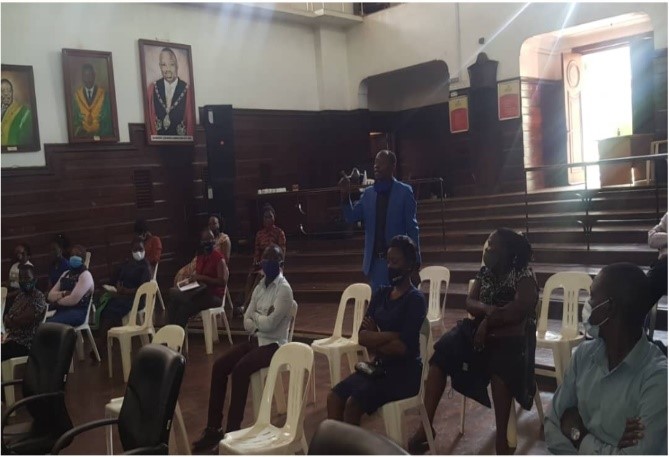
Preliminary results of a study conducted in Kampala have shown that private immunization services providers do not prioritize immunization services as one aspect of service delivery, since it brings in little revenue.
During the dissemination of study results on March 17th, 2021 in the Mayor’s parlor at City Hall, the study team noted that since profit maximization is the main driver for service delivery by the private providers, any aspect that brings in less revenue is not prioritized which extends to immunization services and the data thereof.
The study sought to investigate the implementation challenges that hinder immunization data capture in the private sector, explore how e-health technology can be used to improve performance monitoring and the capture of immunization data into the central HMIS system and document innovative service delivery models for the private sector to improve immunization coverage data to reach the most vulnerable urban populations.
Titled “Improving urban immunization coverage data through the private sector in Kampala,” the study aimed to improve timely and accurate submission of immunization data in Kampala by leveraging the private sector involvement.
The dissemination event was attended by the participating intervention facilities, KCCA Directorate of Public Health and Environment staff, Makerere University School of Public Health, and partners supporting immunization activities within the city.

It was implemented over a one-year period by the KCCA Directorate of Public Health in partnership with MakSPH. The study received financial support from the WHO-Alliance for Health Policy and Systems Research (AHPSR) under the Implementation research program to strengthen data systems for immunization coverage and equity.
The study undertook to improve immunization data quality among the lower level private-for-profit immunization service providers whose objectives included; building capacity for private immunization service providers to collect accurate and submit timely immunization data, provision of enhanced support supervision to the facilities, engaging in CQI around immunization data quality aspects, document lessons and share experiences learned. It was implemented in Kawempe and Makindye divisions among 20 lower-level private immunization service providers.

In this study, researchers collected data on challenges impeding immunization data capture, collaboratively worked with stakeholders to propose strategies to addressing the identified challenges, piloted the proposed strategies, and supported immunization service providers to implement proposed strategies. The KCCA team was led by Dr. Sarah Zalwango and the MakSPH team led by Assoc Prof Elizeus Rutebemberwa and coordinated by Eric Ssegujja a research fellow in the Department of Health Policy Planning and Management.
Among some of the challenges the private immunization service providers faced with regards to the collection of accurate immunization data were the;
- Less prioritization of immunization services by the private providers because it was a free service that extended to the quality of data collected.
- Manual systems of managing immunization data which was tedious
- Poor quality of data which is sometimes cooked because it’s a requirement for receipt of free vaccines from KCCA in exchange for data
- High staff turnover from the private sector which makes capacity-building efforts futile.
- Comprehension with the many immunization data tools and different reporting points
Among the proposed solutions to address the challenges in the private sector were;
- Monitoring of completeness and timeliness in the submission of immunization data
- Strengthening data use at facility level through mentorship at private immunization providers
- Follow up on the continued supply of immunization data tools through support supervision
Implementation of proposed solutions revealed that when private immunization service providers are supported to record and understand the importance of capturing accurate immunization data, they make efforts to submit timely and accurate data.


